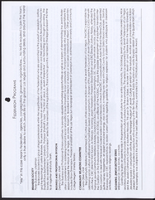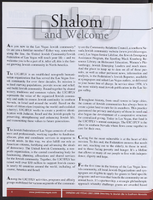Search the Special Collections and Archives Portal
Search Results
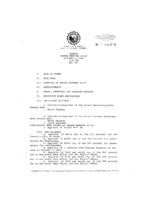
Meeting minutes for Consolidated Student Senate University of Nevada, Las Vegas, October 4, 1990
Date
1990-10-04
Archival Collection
Description
Includes meeting agenda and minutes with additional information about senate bills.
Text
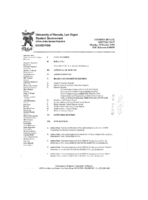
Meeting minutes for Consolidated Student Senate University of Nevada, Las Vegas, October 25, 1999
Date
1999-10-25
Archival Collection
Description
Includes meeting agenda and minutes, along with additional information about bylaws and CSUN funding request forms.
Text

Interview with John Chapman Hopkins, April 11, 2005
Date
2005-04-11
Archival Collection
Description
Narrator affiliation: Physicist, Los Alamos National Laboratory; Test Director; J-Division Leader; Associate Director
Text

Interview with Philip Lyle Ulmer, January 11, 2005
Date
2005-01-11
Archival Collection
Description
Narrator affiliation: Manager, Protective Force, Wackenhut Services, Inc.
Text
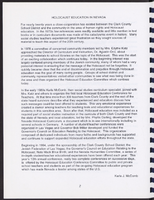
Holocaust Education Conference program, 1997
Date
1997
Archival Collection
Description
Booklet program from the Holocaust Education Conference, 1997.
Text
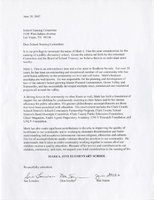
Application and supporting documents for the naming of Mark L. Fine Elementary School, 2007
Date
2007
Archival Collection
Description
The application and supporting documents provide details about Mark Fine and his contributions to Clark County and Las Vegas, Nevada. There are letters of support from many members of the community, including his children and elected officials, and from leaders in religious groups, non-profit organizations and business enterprises.
Text
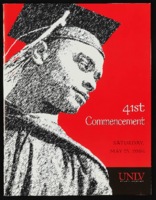
University of Nevada, Las Vegas (UNLV) 41st commencement program
Date
2004-05-15
Archival Collection
Description
Commencement program from University of Nevada, Las Vegas Commencement Programs and Graduation Lists (UA-00115).
Text
Pagination
Refine my results
Content Type
Creator or Contributor
Subject
Archival Collection
Digital Project
Resource Type
Year
Material Type
Place
Language
Records Classification


